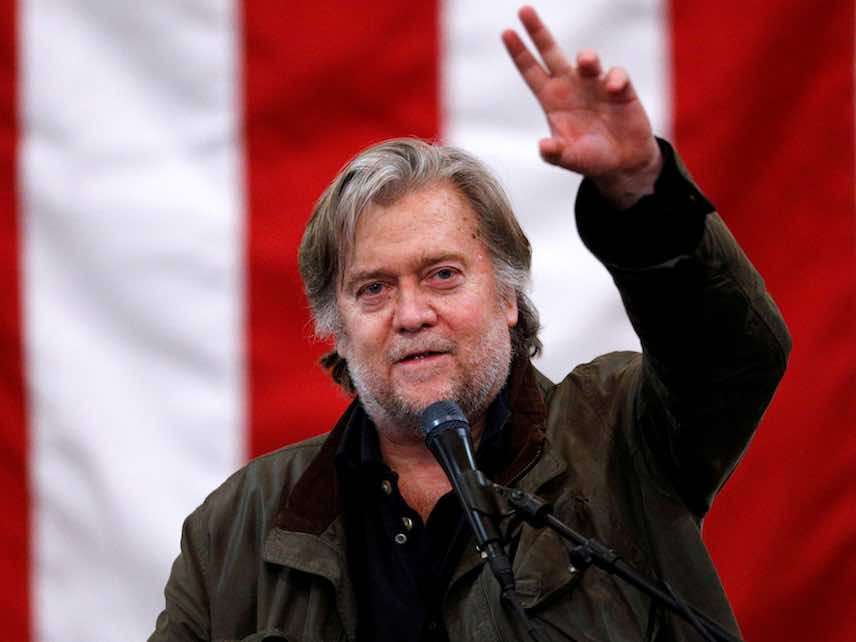New Yorker Caves to Outrage, Disinvites Steve Bannon. Big Mistake.
Editor David Remnick wanted to scrutinize Trump-era populism, but his liberal peers won't let him.

The New Yorker has disinvited Steve Bannon from its annual festival, where the former top aide to President Trump would have been interviewed by David Remnick, the magazine's editor-in-chief.
That's disappointing—running from this fight is a sign of weakness. Disinvitation may cheat Bannon out of a free trip to New York City, but it does little to hurt Bannonism. If anything, it feeds into the far right's victimhood complex and paranoid loathing of the mainstream media.
The decision to cancel Bannon occurred not long after The New York Times first broke the story that Bannon would be making an appearance, which prompted furious outrage from other festival participants, New Yorker staffers, and countless others.
"If Steve Bannon is at the New Yorker festival I am out," tweeted Judd Apatow in a characteristic response to the news. "I will not take part in an event that normalizes hate."
This is naïve. Bannon-style nationalism is already normalized. Bannon does not represent some obscure ideology that will die on its own if we all agree never to talk about it again: His trade and immigration views are shared by millions of Americans, as well as the president of the United States. They are widely discussed on conservative talk radio and cable news, at conspiracy sites like Breitbart and Infowars and Gateway Pundit, and among right-wing social media users. Bannonism is widely available everywhere except liberal enclaves such as prestigious magazine festivals.
I can understand why people would not want to participate in an event where Bannon was celebrated, or even let off lightly. But Remnick seemed committed to scrutinizing him. "I have every intention of asking him difficult questions and engaging in a serious and even combative conversation," he told The New York Times.
Indeed, Remnick mounted an impressive defense of the decision to include Bannon. In a lengthy Medium post, Remnick explained:
The main argument for not engaging someone like Bannon is that we are giving him a platform and that he will use it, unfiltered, to propel further the "ideas" of white nationalism, racism, anti-Semitism, and illiberalism. But to interview Bannon is not to endorse him. By conducting an interview with one of Trumpism's leading creators and organizers, we are hardly pulling him out of obscurity. Ahead of the mid-term elections and with 2020 in sight, we'd be taking the opportunity to question someone who helped assemble Trumpism. Early this year, Michael Lewis interviewed Bannon, who made it plain how he viewed his work in the campaign. "We got elected on Drain the Swamp, Lock Her Up, Build a Wall," Bannon said. "This was pure anger. Anger and fear is what gets people to the polls." To hear this was valuable, as it revealed something about the nature of the speaker and the campaign he helped to lead.
The point of an interview, a rigorous interview, particularly in a case like this, is to put pressure on the views of the person being questioned.
Remnick noted that he didn't expect to change Bannon's mind about anything, nor did he think Bannon fans would be persuaded—if any were even watching. But the exercise would still be worthwhile, he argued:
The question is whether an interview has value in terms of fact, argument, or even exposure, whether it has value to a reader or an audience. Which is why Dick Cavett, in his time, chose to interview Lester Maddox and George Wallace. Or it's why Oriana Fallaci, in "Interview with History," a series of question-and-answer meetings with Henry Kissinger and Ayatollah Khomeini and others, contributed something to our understanding of those figures. Fallaci hardly changed the minds of her subjects, but she did add something to our understanding of who they were.
As loathsome as Bannon is, he's hardly as evil as Ayatollah Khomeini—or former Iranian President Mahmoud Ahmadinejad, who was invited to speak at Columbia University in 2007.
Despite having articulated a powerful argument for letting the interview proceed, Remnick ultimately caved. He didn't provide much explanation, noting only that he wished to appease readers and colleagues who had balked at the prospects of Bannon. I guess I can't really blame him: Losing Jim Carrey, Patton Oswalt, Jimmy Fallon, and all the others who had threatened to cancel would have been a steep price to pay for sticking to his guns.
"Our writers have interviewed Steve Bannon for The New Yorker before, and if the opportunity presents itself I'll interview him in a more traditionally journalistic setting as we first discussed, and not on stage," he said.
I hope he does so. It is liberal audiences like The New Yorker's who benefit most from new insights into Trump's worldview. So many in the mainstream media—myself included—failed to see Trump coming, and wrongly believed he could never be elected president. This does not mean that Bannon is smart and everybody else is dumb: Bannon is wrong about a lot of things, even in the arena of politics, where he now seems like something of a one-hit wonder. But even if Bannon's personal star is fading, this does not mean we can't learn something from him, to better prepare ourselves for the ongoing struggle against his still-quite-ascendant worldview.
The New Yorker is a private company and can interview or not interview whoever it wants. But if bad ideas are so contagious that we must greet them with reflexive, unthinking censorship, we are already doomed. On the other hand, if we believe that good ideas can triumph over bad ideas, then we should have nothing to fear from shining a critical spotlight on them.


Show Comments (221)